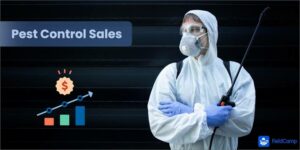The ultimate key to sales success in pest control is building and maintaining strong customer relationships. This involves understanding their specific needs, providing exceptional service, and demonstrating the value of your services
Listening: The Ultimate Key to Sales Success in Pest Control
Listening is not just a passive skill; it’s a fundamental part of the sales process, particularly in industries like pest control where understanding the customer’s unique needs can make or break a deal. In pest control sales, listening actively and attentively is crucial for building rapport, fostering trust, and providing solutions that meet the customer’s specific needs. Successful salespeople don’t simply sell services—they listen, engage, and tailor their approach to each customer’s situation.
Why Listening Matters in Pest Control Sales
In pest control, clients’ needs are often urgent and specific, ranging from a pressing infestation problem to concerns about safety, hygiene, or health risks. Effective listening allows salespeople to not only identify these concerns but also provide tailored solutions that will resonate with the client. Moreover, pest control is a service-based business, which means that the customer will likely be in frequent contact with the salesperson. Building a relationship through listening and empathy is often the key to long-term success.
Clients are more likely to do business with a salesperson who listens to their needs and provides personalized, thoughtful solutions rather than pushing a one-size-fits-all approach. As a result, listening goes beyond simply responding to what the customer says—it’s about creating a dialogue that builds trust and delivers value.

The Importance of Active Listening
Active listening involves more than just hearing the words coming out of a client’s mouth—it’s about interpreting the meaning behind their words, understanding their emotions, and responding in a way that demonstrates empathy and understanding. Active listening requires total focus, withholding judgment, and offering feedback that shows the salesperson is engaged in the conversation.
Key elements of active listening include
The ultimate key to sales success in pest control represents in the following lines:
Focus and Attention
Give the client your undivided attention. Put away distractions like your phone, computer, or notes, and focus entirely on the conversation.
Non-Verbal Cues
Pay attention to the customer’s body language, tone, and facial expressions. Often, the client’s emotions and concerns are communicated through these non-verbal signals, and they can offer valuable insights into their true feelings.
Avoiding Interruptions
Let the customer speak fully without interrupting. Interrupting a client can make them feel unheard or disrespected. Allow them to share all relevant information before offering your response.
Reflection and Clarification
Once the client has spoken, summarize their concerns and feelings to confirm that you understand. This can help the client feel heard and valued.
Effective Listening Strategies for Pest Control Sales
To excel at listening in pest control sales, there are specific strategies and tactics that can be used. By mastering these techniques, salespeople can increase their chances of building lasting relationships, closing deals, and ensuring customer satisfaction.
Asking the Right Questions
Great listeners are also great questioners. In pest control sales, asking the right questions can reveal critical information about the client’s needs and concerns. The goal is to ask open-ended questions that encourage the client to share detailed information about their pest problem, preferences, and fears.
Examples of Open-Ended Questions:
- “Can you describe the extent of the pest issue you’re facing?”
- “What methods have you tried to address the problem so far, and what were the results?”
- “What’s your primary concern when it comes to pest control: effectiveness, safety, or cost?”
- “Are there any areas of your home or property that need special attention?”
By asking these types of questions, you create an opportunity for the client to open up about their situation. This not only shows that you care but also allows you to customize your solution based on what’s important to them.
Using Reflective Listening
Reflective listening involves repeating or paraphrasing what the customer has said to demonstrate that you understand their concerns. This technique helps to confirm your understanding of their problem and makes the client feel heard.
For example, if a customer says, “I’ve tried over-the-counter solutions, but the pests keep coming back,” a salesperson might respond, “It sounds like the solutions you’ve tried haven’t been effective in preventing the pests from returning. Let’s find a more sustainable solution.”
Reflecting their words also allows the salesperson to clarify any misunderstandings and ensures both parties are on the same page. This establishes a connection and builds trust, which is essential for a successful sales interaction.
Empathy and Understanding
Empathy is at the core of effective listening. It involves not just understanding what the client is saying but also recognizing their emotional state and showing compassion. In the pest control industry, many customers are experiencing stress or frustration due to pest problems, and showing empathy can go a long way in gaining their trust.
- When a customer expresses frustration about a recurring pest problem, a salesperson might say, “I can understand how upsetting it must be to deal with an ongoing pest issue. Let’s work together to find a solution that works for you.”
- Empathy allows the salesperson to connect with the client on a human level, which is a powerful way to build rapport and make the client feel comfortable.

Silence as a Powerful Tool
Sometimes, the most effective form of listening is simply staying quiet. Allowing space for the client to express themselves without interruption can be incredibly powerful. Silence can encourage the customer to elaborate on their concerns, giving the salesperson more detailed insights into their situation.
For example, if a customer says, “I’m not sure if I can afford the service right now,” allowing a moment of silence can prompt them to continue, perhaps revealing that they are more concerned about the long-term benefits or the safety of the treatment rather than the price itself.
Silence also provides the salesperson with a moment to think carefully before responding, which can lead to more thoughtful, relevant responses.
Practical Exercises to Improve Listening Skills
To improve listening skills in pest control sales, it’s essential to practice these techniques regularly. Below are a few practical exercises that can help sharpen active listening skills:
Role-Playing Scenarios
Goal: To practice listening and responding thoughtfully in a realistic sales situation.
Instructions:
- Role-Play Setup: Pair up with a colleague or supervisor to role-play a pest control sales conversation. One person plays the role of the salesperson, while the other acts as the client.
- The Scenario: The client calls with a pest problem in their kitchen (e.g., ants, cockroaches, rodents). They are looking for a solution but have concerns about the safety of treatments for their pets and children.
- Guidelines: The salesperson must ask open-ended questions, reflect the client’s concerns, and respond empathetically. The goal is to build trust through active listening and offer a tailored solution based on the client’s needs.
- Debrief: After the role-play, conduct a debrief with your partner or supervisor to evaluate the effectiveness of the listening techniques used. Discuss areas where you can improve.
Listening to Customer Feedback
Another exercise is actively seeking feedback from existing customers. After providing pest control services, ask customers to share their experiences and concerns. Pay attention to both their verbal and non-verbal feedback, and use it to adjust your approach or services.
Reviewing Sales Calls and Interactions
Take the time to listen to recordings of your past sales calls or meetings. Analyze how well you listened to the client and whether you responded thoughtfully. Pay attention to moments where you may have interrupted the client or missed valuable cues. Use this analysis to refine your listening skills in future interactions.
- Case Study
- Listening Leading to a Successful Sale
- Case Study:
- Addressing Specific Concerns
A client called a pest control company to report an ongoing issue with rodents in their kitchen. The client expressed concern not only about the infestation but also about the safety of the treatments for their young child and pets. Rather than pushing a standard service package, the salesperson took the time to listen to the client’s fears and frustrations. They asked detailed questions about the client’s home, the areas where the rodents had been seen, and what solutions the client had already tried.
After gathering all the necessary information, the salesperson recommended a safe, eco-friendly solution tailored to the client’s needs. They reassured the client about the safety of the treatment and explained the steps that would be taken to ensure the home would remain safe for children and pets.
By taking the time to listen carefully, the salesperson was able to provide a solution that not only solved the immediate pest problem but also aligned with the client’s values. The client was impressed with the personalized attention and ultimately decided to move forward with the service.
- Becoming an Outstanding Salesperson Through Effective Listening
Listening is the bedrock of successful pest control sales. To become a top-performing salesperson, you need more than just knowledge of your products and persuasive selling skills—you need to be able to actively listen to your clients and offer solutions that meet their specific needs. By asking the right questions, reflecting on the customer’s concerns, showing empathy, and using silence strategically, you can foster trust and build long-term relationships with clients.
Effective listening is a skill that can be developed and refined over time. Through regular practice, role-playing, and reviewing your interactions, you can enhance your listening abilities and become an even more effective salesperson. By making listening a priority in your sales process, you will not only close more deals but also create loyal customers who trust you as a reliable expert in the pest control industry.
Ultimately, the ability to listen effectively sets great salespeople apart from the rest. It’s the key to understanding your clients’ true needs and delivering solutions that go beyond just selling a service—solutions that address their concerns and add value to their lives.




